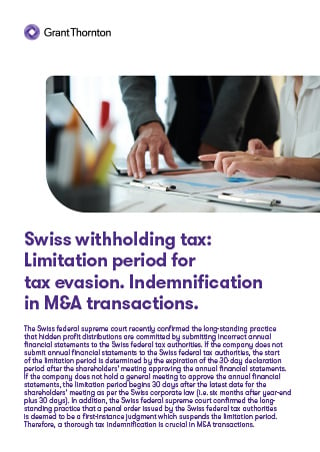
In general, the limitation period for Swiss taxes is five years, but it can be up to seven years for Swiss withholding tax purposes in case of tax evasion and fraud.
In the event of withholding tax evasion (e.g. non-declaration of hidden profit distributions in case of factual liquidations etc.), the Swiss federal tax authorities generally initiate administrative criminal proceedings and extend these to the board members, who are jointly and severally liable for the withholding tax of the company as taxpayer. The Swiss federal tax authorities typically issue a penal notice against which the taxpayer can lodge an appeal within 30 days and then a penalty order against which the taxpayer can request a decision by the criminal court within 10 days of notification.
Recently, the Swiss federal supreme court has confirmed the long-standing practice that a penal order issued by the Swiss federal tax authorities is deemed to be a first-instance judgment which suspends the limitation period. This is in line with the Swiss Federal Constitution and the European Convention on Human Rights which ensure an assessment through an independent and impartial court.
The Swiss federal supreme court confirmed that from a Swiss withholding tax perspective, hidden profit distributions (i.e. non-cash benefits/benefits in kind to shareholders and related parties) are committed by a company/taxpayer by submitting annual incorrect financial statements to the Swiss federal tax authorities. If the company does not submit annual financial statements to the Swiss federal tax authorities, the start of the limitation period is determined by the expiration of the 30-day declaration period after the shareholders’ meeting approving the financial statements. If the company does not hold a general meeting to approve the financial statements, the limitation period begins 30 days after the latest date for the shareholders’ meeting as per the Swiss corporate law (i.e. six months after year-end plus 30 days).
Thus, it is key that buyers of a Swiss target company carefully negotiate representations and warranties as well as indemnification clauses and their limitations in the share purchase agreement.
Grant Thornton Switzerland is well-positioned and has in-depth knowledge and experience in advising throughout the transaction and deal cycle, including negotiation of share purchase agreements.


